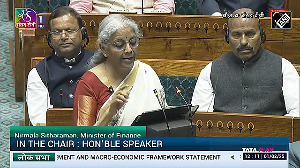If the new Companies Bill becomes law, 10 of the 30 Sensex companies will have to look for new auditors. One of every three companies on the Bombay Stock Exchange's 30-share benchmark, the Sensex, will have to look for new auditors if proposals in the new Companies Bill become law.
One of every three companies on the Bombay Stock Exchange's 30-share benchmark, the Sensex, will have to look for new auditors if proposals in the new Companies Bill become law.
The Bill, a comprehensive revision of the 55-year-old law, has proposed periodic rotation of auditors and audit agencies.
An individual auditor in the case of listed companies shall not be appointed for more than five continuous years and cannot be reappointed in the same company for another five years after completion of the term.
If the auditor was a company, it shall not be appointed for more than 10 years (two terms of five years each) and cannot be reappointed in the same company for another five years after completion of the term.
Also, the company may now resolve that in the case of an audit firm, the auditing partner and his team shall be rotated every year or the audit shall be conducted by more than one auditor. A three-year transition period has been given.
New auditors for 30 firms
Ten out of the 30 present Sensex companies, including Reliance Industries, Hindustan Unilever and Hero MotoCorp, have had the same auditors for 10 years or more, data compiled by the Business Standard Research Bureau showed.
And, 23 of the 30 Sensex companies have had the same auditors for more than five years. In smaller companies, the relationship is stronger and, in many cases, longer.
"The spirit of rotation of audit firms is to ensure that auditors function at arms-length distance from the company owners and management, and safeguard the interest of investors at large. It is not onerous on the system to ensure rotation; there are enough qualified audit firms and audit partners," said Shriram Subramanian, founder and managing director, InGovern Research Services, a Bangalore-based proxy advisory and corporate governance research company.
He feels group companies should not interchange auditors. "Also,
The big four global accounting firms -- Ernst & Young, PwC, KPMG and Deloitte Touche Tohmatsu -- serve clients through Indian affiliates. For example, Deloitte Touche Tohmatsu's Indian affiliates include C C Chokshi & Co, A F Ferguson & Co, Fraser & Ross, MCA & Co, P C Hansotia and Deloitte Haskins & Sells.
Similarly, KPMG's Indian affiliates include BSR, BSR & Associates and BSR & Company. If one included such associate firms, the number of companies that need to hunt new auditors could be even higher.
"The intent of the law is to discontinue the association of the auditors with the company, so that they may not have any temptation to shield shortcomings of the management from shareholders and to ensure independence of auditors and quality of audits," a note prepared by Corporate Professionals said.
It added that the step might prevent recurrence of fraud by promoters and managements in connivance with auditors, and enhance the interest of listed companies' stakeholders, including lenders such as banks and financial institutions.
For quality audit
Such mutual relationships are believed to be the cause for the financial fraud at Satyam Computer Services and in helping the collapse of Lehman Brothers in recent years, and for the demise of Enron and WorldCom in the early part of this decade, according to Corporate Professionals.
However, not everyone is in favour of a compulsory rotation of auditors for listed Indian companies.
"Periodic rotation is a kind of trade-off between quality and independence. It's a good move from the perspective of independence of an auditor from the company.
But, the counter-argument is that if you have audited a firm's accounts for a number of years, you will be able to understand its business better," said Sandeep Parekh, founder of Finsec Law Advisors.
"In my view, the issue of rotation of auditors should have been recommendatory rather than compulsory. This decision should have been left to the companies."









 © 2025
© 2025